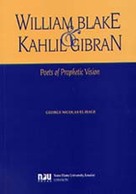William Blake and Kahlil Gibran: Poets of Prophetic Vision
William Blake and Kahlil Gibran, Poets of Prophetic Vision is a book of literary criticism in English. This book is a comparative study of two major Romantic poets and is unique in its scope and content. Its uniqueness and relevance stem from the fact that it remains the only comprehensive comparative study done on Blake and Gibran. While some remarks about Blake’s influence on Gibran can be found scattered in books on the Lebanese-American poet, no other serious attempt has been made to bring the two major authors together in a thorough comparison with a detailed analysis of their works. In addition to asserting Blake’s supreme influence on Gibran, this book also explicitly addresses the influence of the Bible on the writings, artwork and lives of both Blake and Gibran. It highlights the effect of Anglo-American Romanticism and the Transcendentalist Movement on the Lebanese poet and traces the temporary, yet powerful, impact of Nietzsche on Gibran. The book also attempts to explore the importance of prophetic vision, to address prophecy, to define the function of imagination in relation to nature, and to establish the role of the poet as the supreme visionary and prophet. There is evidence that Gibran knew some of Blake’s poetry and was familiar with his drawings during his early years in Boston. However, this knowledge of Blake was neither deep nor complete. Kahlil Gibran was reintroduced to William Blake’s poetry and art in Paris, most likely in Auguste Rodin’s studio and by Rodin himself. It was then that Gibran read Blake’s complete works and his biography and carefully studied many reproductions of Blake’s drawings. From that time on, Blake played a special role in Gibran’s life. In Paris, Gibran was called “the twentieth-century Blake.” Blake’s and Gibran’s reading of the Bible, their rebellion against Church corruption, and their sociopolitical visions were very similar. Both men rejected reason in favor of imagination and shared the muse of art and poetry equally. This is not to say that Gibran was a mere copy of Blake, but to affirm that in Blake he found the support and confirmation for his own early doctrines that he developed before or during reading Blake. The book also highlights and analyses the two differences in the authors’ convictions: their respective concepts of Nature and their views of Reincarnation. The book is divided into five chapters and it places Gibran in his proper historical context as it attempts to draw contrasts and comparisons with all major Anglo-American romantic and transcendentalist writers. It concludes with presenting both Gibran and Blake as poets of the Bible and tries to clarify the controversy regarding Gibran’s response to Nietzsche’s “Thus Spoke Zarathustra.” Gibran respected Nietzsche and learned from him how to present his ideas in a messianic overtone. However, Gibran disagreed with the German philosopher and fully accepted Blake’s concept of Christ. Christ remained Blake’s and Gibran’s idol and hero, the role model after whom they fashioned their lives.
William Blake and Kahlil Gibran, Poets of Prophetic Vision is a book of literary criticism in English. This book is a comparative study of two major Romantic poets and is unique in its scope and content. Its uniqueness and relevance stem from the fact that it remains the only comprehensive comparative study done on Blake and Gibran. While some remarks about Blake’s influence on Gibran can be found scattered in books on the Lebanese-American poet, no other serious attempt has been made to bring the two major authors together in a thorough comparison with a detailed analysis of their works. In addition to asserting Blake’s supreme influence on Gibran, this book also explicitly addresses the influence of the Bible on the writings, artwork and lives of both Blake and Gibran. It highlights the effect of Anglo-American Romanticism and the Transcendentalist Movement on the Lebanese poet and traces the temporary, yet powerful, impact of Nietzsche on Gibran. The book also attempts to explore the importance of prophetic vision, to address prophecy, to define the function of imagination in relation to nature, and to establish the role of the poet as the supreme visionary and prophet. There is evidence that Gibran knew some of Blake’s poetry and was familiar with his drawings during his early years in Boston. However, this knowledge of Blake was neither deep nor complete. Kahlil Gibran was reintroduced to William Blake’s poetry and art in Paris, most likely in Auguste Rodin’s studio and by Rodin himself. It was then that Gibran read Blake’s complete works and his biography and carefully studied many reproductions of Blake’s drawings. From that time on, Blake played a special role in Gibran’s life. In Paris, Gibran was called “the twentieth-century Blake.” Blake’s and Gibran’s reading of the Bible, their rebellion against Church corruption, and their sociopolitical visions were very similar. Both men rejected reason in favor of imagination and shared the muse of art and poetry equally. This is not to say that Gibran was a mere copy of Blake, but to affirm that in Blake he found the support and confirmation for his own early doctrines that he developed before or during reading Blake. The book also highlights and analyses the two differences in the authors’ convictions: their respective concepts of Nature and their views of Reincarnation. The book is divided into five chapters and it places Gibran in his proper historical context as it attempts to draw contrasts and comparisons with all major Anglo-American romantic and transcendentalist writers. It concludes with presenting both Gibran and Blake as poets of the Bible and tries to clarify the controversy regarding Gibran’s response to Nietzsche’s “Thus Spoke Zarathustra.” Gibran respected Nietzsche and learned from him how to present his ideas in a messianic overtone. However, Gibran disagreed with the German philosopher and fully accepted Blake’s concept of Christ. Christ remained Blake’s and Gibran’s idol and hero, the role model after whom they fashioned their lives.

